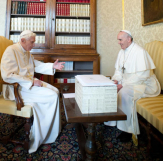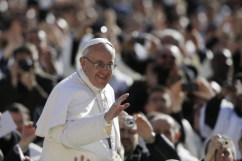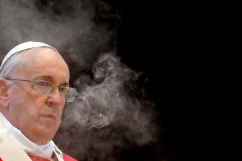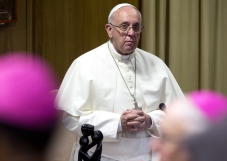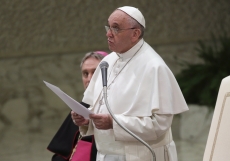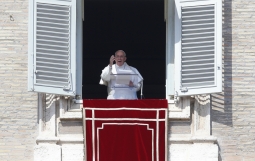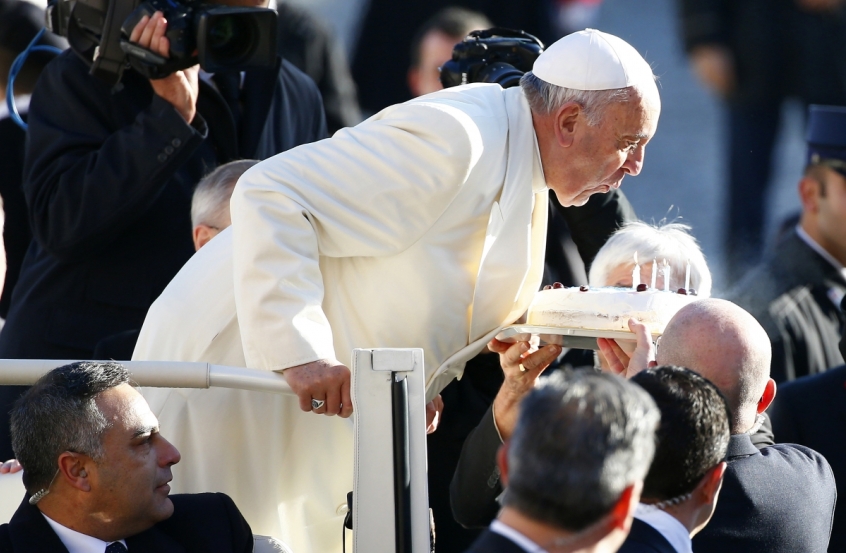
It is two years today since the puff of white smoke from a chimney of the Sistine Chapel signalled the election of Jorge Mario Bergoglio as the next pope. So, how's he doing so far?
What's gone well?
Public opinion
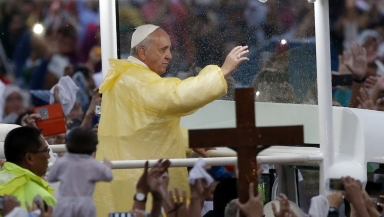
There is no doubt that Pope Francis is well loved. According to Pew Research, he has an 84 per cent approval rating in Europe, and as many as nine in ten US Catholics have a "favourable" view of him. On his recent visit to the Philippines he led Mass for a crowd of 7 million people, the largest number ever recorded at a papal gathering.
First impressions are crucial: on being elected one of his first decisions was to turn down the apostolic apartments and opt for something less exclusive – a suite at the Vatican guesthouse. Behaving more like a Jesuit priest and less like an international statesman has gone down well with those outside the Church, particularly at a time when people are fed up with politicians saying much and doing little.
But speech matters too, and Francis has spoken in an inclusive way that has won over liberals and the media. (This has, however, brought criticism from conservatives who see him as being liberal himself.) Francis has repeatedly stressed the need for the Church to be grounded in pastoral realities; one outcome of this is much discussion of communion for those who are divorced and have remarried. On homosexuality he famously said in July 2013: "Who am I to judge" – which was seen by some as an endorsement of the homosexual lifestyle and by others merely as a recognition of the need for humility when discussing the issue.
His humility, charismatic theology and his emphasis on the need for evangelism have also helped forge relationships with charismatic evangelicals. In February 2014 he recorded a video message for a Pentecostal conference led by Kenneth Copeland, and in November Rick Warren was invited to speak on marriage at the Humanum Conference, an interfaith gathering reflecting on the 'complementarity of man and woman'.
Broadening the debate
The pope's desire to welcome people into the fold has also enabled him to speak on a broader set of issues. He seems to be able to be viewed in the secular public arena as distinct from the Church's teachings on abortion and contraception, often criticised by non-Catholics, even though he undoubtedly supports those conservative doctrines.
He's installed showers for the homeless in St Peter's Square, and provided them with haircuts. On his birthday he sent people out delivering sleeping bags to the homeless, and invited four homeless people to join him for lunch. All of these gestures, and many more beyond the walls of the Vatican, have signalled his concern for the poor and marginalised. The consistency with which he has championed the rights of the poor, combined with his own modest lifestyle, has kept these measures from being seen as gimmicks and publicity stunts.
As the first ever pope from the southern hemisphere, he's also worked to make the upper echelons of the Catholic Church more representative of the people they lead. The 20 new cardinals installed in February were from 14 different countries, including Myanmar, Tonga and Ethiopia. This too is seen as a way of elevating the voice of the poor.
Francis has also been vocal on climate change, describing it as "mostly man made". Later this year he is due to publish a much-anticipated encyclical (a papal letter to bishops) on climate change, in which he is expected to draw a link between caring for creation and concern for the poor. Some have said he should stick to 'moral' issues, though the counter-argument would be that the effect of climate change on the poorest in the world makes it a moral concern.
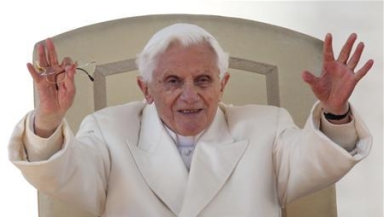
Vatican reform
With highly publicised scandals and allegations of corruption, it was widely recognised before Francis' election that an overhaul of Vatican finance and administration was needed. He hasn't held back in his criticism of the Roman Curia – the Vatican officials who help govern the Church. His not-so-cheery Christmas 2014 message to the Curia included a list of 15 'diseases' in the Vatican that are weakening the Church and its mission, which included materialism, "rivalry and vainglory" and a lack of cooperation.
In his bid to clean up Vatican finances, Francis has removed four of the five cardinals in charge of the Vatican bank. He's also instated Cardinal George Pell as Secretariat of the Economy, a new role that oversees Vatican finance. Pell has already implemented strong transparency and accountability measures.
Pope Francis has also made progress in tackling sex abuse within the Church. In 2013 he launched a new commission to prevent clerical sexual abuse, and has in recent weeks encouraged bishops not to let a fear of scandal prevent them from reporting it. In July 2014 he met with sex abuse victims and apologised on behalf of the Church. Denouncing the crimes as similar to those of a "sacrilegious cult", Francis asked "for the grace to weep, the grace for the Church to weep and make reparation for her sons and daughters who betrayed their mission, who abused innocent persons." Some have been critical of his seeming lack of urgency in addressing this issue.
But as well as concrete steps of reform, Francis has linked the need for institutional reform with personal sanctification. Speaking of the reforms in October, he said: "All of these are external renewals: this is what they say daily ... It is curious, no one speaks of renewal of the heart. They do not understand at all what is meant by renewal of the heart, which is sanctity, renewing everyone's heart."
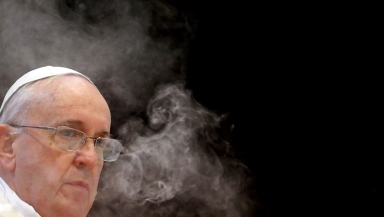
What hasn't gone so well?
Extraordinary synod on the family
In 2013 Francis called for an extraordinary synod on 'pastoral challenges of the family in the context of evangelisation', which took place in October 2014. Half way through the two-week synod meeting a mid-term report was released, which called for simplifying the annulment procedure, introducing a "case-by-case" approach to communion for divorcees who have remarried, and reflection on the acceptance of homosexuals in the Church.
The report drew condemnation from conservatives, who feared that this would mean substantial doctrinal changes. Conservative group Voice of the Family described the report as "one of the worst official documents drafted in Church history" and "an attack on marriage and the family". The Vatican was forced to clarify that it was not a change in doctrine, but a working document for discussion and reflection.
Ultimately, the synod concluded without making any doctrinal changes, but left conservatives worried about the direction of the Church. The final report included three paragraphs on homosexuals and communion for remarried couples that had not received the required two-thirds majority vote. At the end of the synod, Francis said there had been many "consolations" but also "moments of desolation, of tensions and temptations". The same issues will be central to the next Synod on the Family in October 2015.
'You can't make fun of faith'
Francis has had the occasional moment of difficulty with the media. In the wake of the attacks on the satirical magazine Charlie Hebdo in January, he said: "You can't provoke, you can't insult the faith of others, you can't make fun of faith." This emerged as part of lengthy discussion about whether it was or was not acceptable to offend someone's religion.
While Francis strongly condemned the shootings, and said that he did not condone the use of violence, and believed in the right to free speech, he added that there were limits to freedom of expression. He illustrated his point by saying about his aide: "if [he] says a curse word against my mother, he can expect a punch, it's normal."
The remarks were made on the plane to the Philippines, in an informal setting, but required subsequent clarification from the Vatican to explain what he meant – that he by no means thought the attack justified, only that a response to the magazine's treatment of faith should have been expected. His comments were seen as going against the tidal wave of opinion in support of free speech.
Vatican opposition
Not everybody loves him, and it's not only his stance on pastoral issues that has irked critics. Austen Ivereigh, a biographer of the pope, told Christian Today in November: "It is always striking to me when I go to Rome to find out that the enthusiasm for Pope Francis which is phenomenal, remains phenomenal in the wider world, isn't particularly shared in Rome. In fact you talk to Vatican officials and they look very worried, they say, 'We don't understand what's going on, we don't know what he's doing, we can't make him out.'"
Aside from questioning his stance on doctrine, there have been concerns about Francis' lack of deference for tradition – particularly where the Latin Mass is concerned. Pope Benedict made it easier for priests to use the Latin liturgy, but Francis has been accused of dismissing this return to tradition. Last week at a service marking the 50<sup>th anniversary of the first time a pope celebrated Mass in the vernacular, he gave thanks for the "courageous move by the Church to get closer to the people of God", according to the Catholic News Service. He said in his homily that "The liturgy isn't something odd, over there, far away" but is supposed to have an impact on everyday life.
Francis has also put some noses out of joint with his new cardinal appointments – some of the countries from which he chose cardinals have never had a cardinal before, and in doing so he overlooked some hopeful candidates closer to the Vatican.
At least outside of Rome, there has been a warm reception for Francis' pretty radical overhaul of both the systems and the perception of the Catholic Church. Whether these changes can be sustained, or whether it will falter in the face of with opposition, remains to be seen. Time will tell whether his efforts to rid the church of financial and sexual scandal prove successful, and in October we will see whether steps toward inclusivity are about more than just language.










